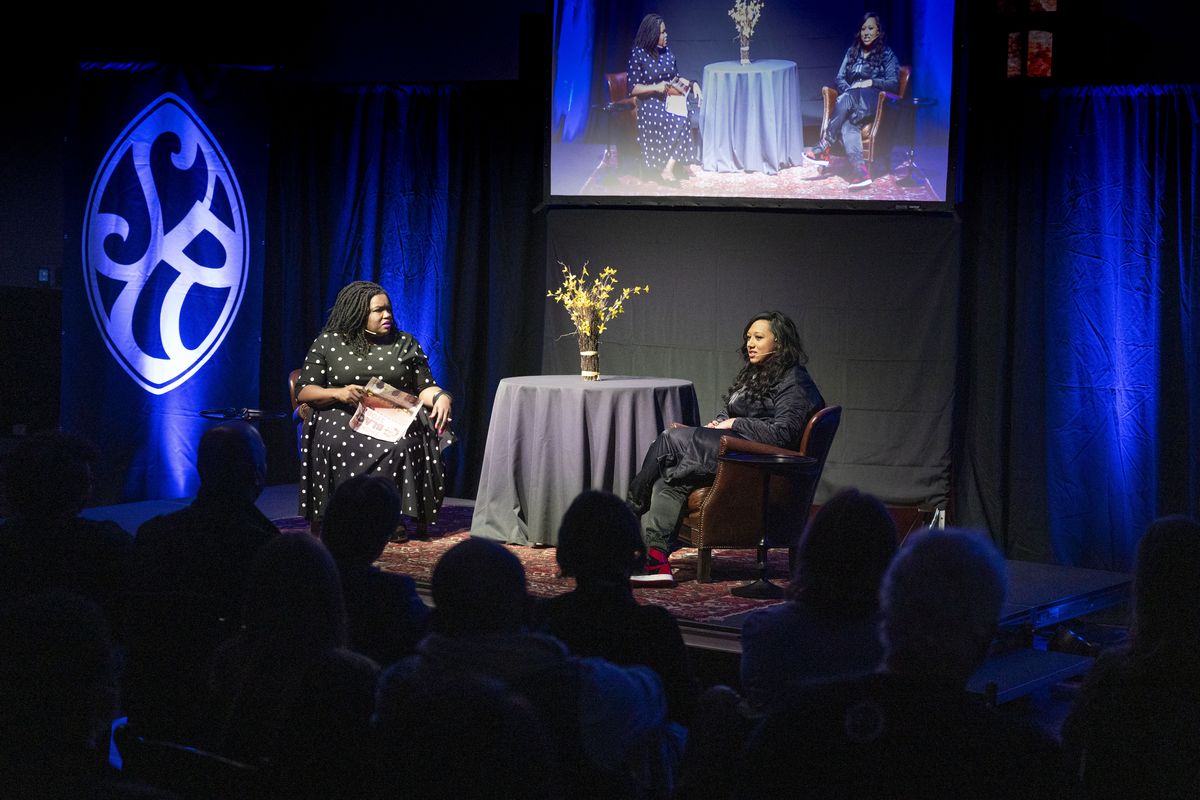Black Stories Symposium: Mandi Price, Kiantha Duncan and Black students ‘tell our truths’ at Northwest Passages event

Every voice was lifted, and every voice sang as members of the Spokane community gathered to honor the stories of Black students and celebrate the accomplishments of Mandi Price, who worked her way from Shadle Park High School graduate to producer of some of Hollywood’s hottest television shows.
The Black symposium hosted by The Spokesman-Review’s Northwest Passages Book Club featured the writings of Nwannediya Kalu, Anthony Giron, Jalen Fojas, Therisa Niven and Tajari Jones. Every story captured struggle and the will to overcome.
Mistreatment taught Kalu the essence of Blackness and how to bridge herself with Black culture.
“It allowed me to feel a sense of comfort,” she said in conversation with Amber D. Dodd, who covers racial equity issues for the S-R and also contributes to the Black Lens newspaper.

Navigation through different cultural backgrounds helped Giron to integrate and embrace every part of who he is. “It’s a balancing act,” he said.
The lack of opportunity to explore her Black cultural background showed Fojas the absence of understanding and awareness that exists within our communities.
Niven constructed a path through writing to express the emotions she sometimes feels cannot be understood out loud. “Writing is a break from reality,” Niven said.
And Jones found comfort in using her responses to make up for the lack of diversity that exists within the educational field in Spokane.
As Price and Kiantha Duncan, president of the local chapter of the NAACP, headlined the event, they often spoke directly to the high school students, imploring them to pursue their passions, overcome their fears and become Black leaders in their communities.
“The world is ahead of you,” Duncan told the students.
“As a storyteller, we have to tell our truths,” added Price.
One of the most poignant moments came courtesy of Vienna Bighorse. She’s a member of the Coeur d’Alene Tribe and asked Duncan whether she could ask a question of Price.
Duncan handed her the microphone and Bighorse told Price that she just had her 9th birthday and a lot has changed in her life, and that people act differently now.
She acknowledged these days that she was a “little scared” and overwhelmed. Then she asked Price what she does when she is scared and thinks that too much is changing too quickly.
There were some gasps, then the room fell silent. Duncan swept the girl from her seat right up to the stage. Price talked about change and assured her everything would be OK.

Earlier, Price recalled her own story by sharing the comfort she had growing up as an adopted child in Spokane with a loving family. She talked about being the only person of color in class during many of her years in Spokane schools and how it wasn’t until she traveled to Virginia for college when she began to question how she fit in and what group she could turn to for a sense of belonging.
Duncan and Price also touched on the topic of Historically Black Colleges and Universities.
Price returned to Spokane and attended Gonzaga University. After college, she worked as an airline gate agent and baggage handler. And then she lost a dear friend. So she searched for opportunity by sending out more than 1,000 job inquiries to Hollywood executives until one finally offered her a chance. She turned that opportunity into a break.
“What made you say, I’m not giving up?” Duncan asked her.
Price answered: “I made a promise to live my best life.”
As a woman of color, Price highlighted the issues of sacrifice and always having to prove yourself. Even with her establishment, education and success in the workroom, there are times when Price is ignored.
Being able to do something you love as a person of color means that you must choose to participate and look to the bigger picture.
“Life is real, and life is hard,” Price said.
Being a person of color in Spokane can be somewhat lonely at times. But with her faith and tremendous love for the city, Price said she believes people have the power to change that.
“We are a community that loves community, and we learn to love everyone.”